If you love to cook, you’ve probably learned how to make your first dish on a gas stovetop.
Aside from being the most common type of stove available, it’s also known for its affordability and reliability. So it’s no surprise when almost everyone you know has one in their kitchen.
But thanks to modern technology, new cooktops have been popping up in the culinary world.
You know you adore your gas stovetop, but ever since you’ve heard great things about induction cooktops, you’ve been curious to see what it can do for your kitchen.
But because of its high price point, you need to make sure if induction is worth the investment.
So, which is better: gas or induction cooktop? You’ll have to read more to find out.
What is an induction cooktop?
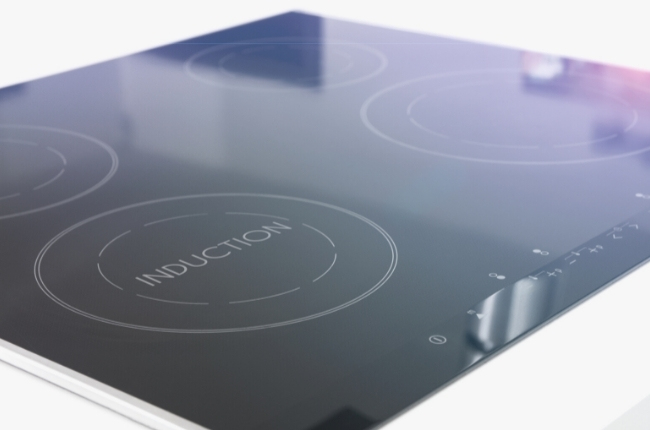
On the outside, an induction may easily be mistaken for an electric cooktop since they have similar ceramic glass tops. But once you turn them on, you’ll know which one is induction since it’s known for its unconventional way of heating.
Instead of using open flames to cook, an induction cooktop uses electromagnetic energy to heat your pots and pans directly.
This comes from a copper coil installed underneath the glass top, which creates a magnetic field when you use it with induction-ready cookware. This provides even and efficient heating for cooking; that’s why most cooks love having them in their kitchen.
Do professional chefs use induction?
While each chef may have their own preferred methods of cooking, most would agree that using induction cooktops in a commercial setting can make a big difference.
For instance, since induction has digitized settings, chefs can simmer or boil ingredients at a constant temperature for extended periods without worrying about burning or ruining their dishes.
Since a restaurant kitchen is fast-paced, an induction can also keep up with its speed since it can heat up faster than a traditional gas range. This helps chefs become more efficient as they can complete more orders in a shorter time span.
Considering these are only some of the advantages an induction can do, professional chefs really value its convenience to the point that some have switched over their gas ranges at home.
What is a gas cooktop?
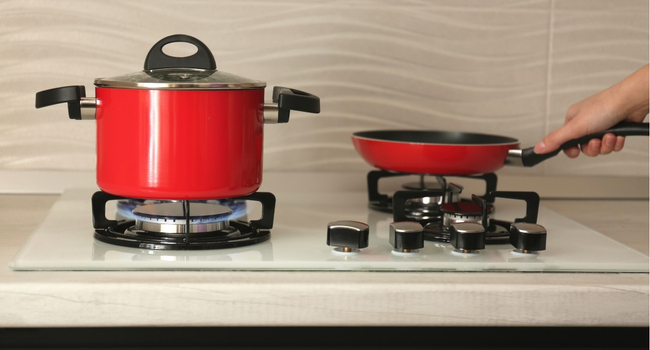
If you spend hours perfecting your kitchen recipes, you’re probably more familiar with cooking with a gas cooktop.
It uses flames to heat your pans, so it’s easier to control since you can see how high or low the fire is. But considering gas cooktops mostly have dials for controlling the heat, it can be challenging to get a precise temperature for cooking.
Gas cooktops also need a connection to a gas line to work, so it’s always recommended to call a professional if you need to install one.
But even though there are other technologically-advanced cooktops available on the market, some would still choose to use a gas cooktop because it does the job of heating and cooking well.
Induction vs. gas cooktop pros and cons
If you still can’t decide whether to switch to an induction cooktop or stick with your gas stove, here are their strengths and weakness to help you choose:
Induction cooktop vs. gas efficiency
One of the notable features an induction cooktop has is it doesn’t use open flames to heat your cookware. It uses electromagnetic energy, so cooking on an induction cooktop vs. gas is more efficient.
That’s because induction-compatible pans will receive 90% of the heat generated by the cooktop since it absorbs it directly. Whereas a gas cooktop needs to convert its energy into heat first — that’s why a pan can only absorb 40-55% of it.
As a result, you’ll notice that boiling a pot of water on an induction cooktop will take less time than on a gas stove.
So if you’re looking for a cooktop that could improve your speed in the kitchen, induction would be the way to go.
Induction cooktop vs. gas price
If you’re worried about the price points of each cooking appliance, a gas cooktop is easily the more affordable one.
The average price of one gas unit will be around $300-1,500. In contrast, an induction cooktop has an average price of $1,000-2,500, depending on the brand and number of burners you choose.
Additional features like a bridge burner, high-heat burner, or automatic reignition are all useful for cooking but will most likely cost you extra. So it’s best to choose a unit that will suit your budget and cooking needs.
Induction cooktop vs. gas cost
One aspect most home cooks will overlook when looking for a new cooktop is the cost of their monthly usage.
Naturally, the amount of time you’ll spend cooking on your cooktop will greatly affect its cost. But if you spend less than an hour per day on a gas cooktop, it will only take you around $6.99 a month to maintain it.
While an induction cooktop will need electricity to run, it’s a common misconception that it will significantly affect your electricity bill. That’s because it will take less time to cook your meals as it’s built for efficiency.
If the average price of electricity is 12 cents per kilowatt-hour, a 1500-watt induction cooktop will cost you $0.18 per day and $5.4 per month.
The price will change depending on which state you’re living, so it’s best to do your own calculations so you’ll know the exact value.
Induction vs. gas: Cleaning
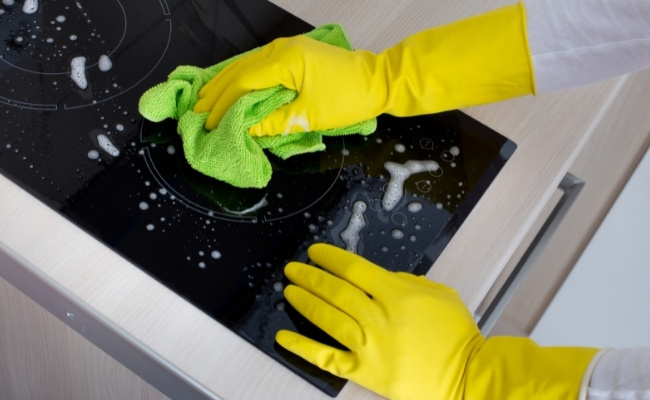
Another advantage an induction cooktop has over a gas stove is its ease of cleanability. Since it has a smooth glass top, you’ll only need to wipe down its surface to get rid of spills.
Granted, it’s more prone to scratching, but if you keep a light hand while cooking, you’ll most likely avoid leaving any marks.
While cleaning a gas cooktop will require a bit more effort since you’ll also need to clean its metal grates along its surface. Since a gas stove has protruding burners, you’ll also have to ensure you’ll get any spills in its crevices to prevent them from accumulating.
What are the disadvantages of induction cooking?
Induction-ready cookware
An induction cooktop may have several merits when it comes to cooking, but one downside of owning one is you’ll need to have induction-ready cookware for it to be functional.
As discussed above, an induction cooktop uses electromagnetic energy to heat pans directly. So you’ll need to use cookware that has magnetic bases to successfully create a magnetic field.
Metals like cast iron and some stainless steel are the type of cookware that is induction-compatible. So if you don’t already have these in your kitchen, getting new ones can get expensive.
Pacemakers
If you have a pacemaker to regulate your heart activity, operating an induction cooktop is not advisable since its electromagnetic energy will interfere with its functions.
So if you’re thinking about switching to an induction cooktop, it will be better for your health if you stick to a gas stove.
But if you already have one at home, doctors recommend that you stay at least 60cm (2ft) away when it’s on to prevent it from messing with your pacemaker.
Power outages
Another disadvantage an induction cooktop has over a gas stove is its inability to turn on during a power outage.
Since induction uses electricity to function, you won’t be able to cook anything until the electricity comes back.
So if an induction cooktop is the only cooking appliance in your kitchen, it would be a good idea to stock up on ready-to-eat foods just in case.
What are the disadvantages of a gas cooktop?
Fire hazard
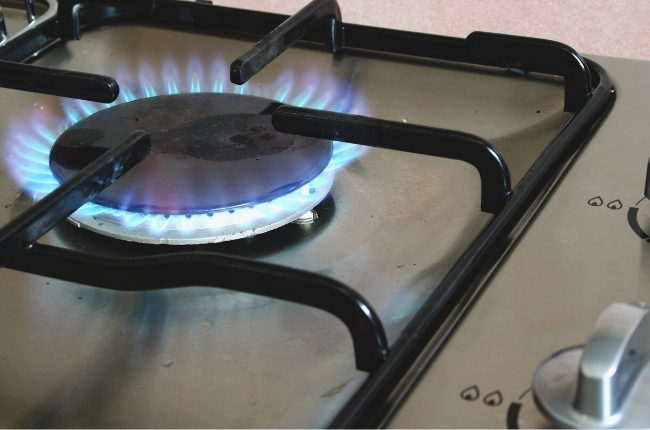
Since a gas cooktop’s main source of heat is an open flame, the chances of starting a fire are always risky if you’re not careful when cooking.
An experienced cook would know not to leave anything flammable near an open burner. But the minute you forget a kitchen towel or oven mitt near a flame, a dangerous fire could start if you don’t know how to extinguish it.
So if you have a gas cooktop, it’s always a good idea to know how to douse different types of kitchen fires to keep you and your family safe.
Carbon Monoxide Poisoning
Most home cooks don’t know that gas cooktops emit carbon monoxide (CO) every time you turn them on since it’s an odorless and colorless gas.
In great amounts, CO can lead to headaches, dizziness, and vomiting. So if you experience any of these symptoms when cooking, you’ll need to call for medical assistance immediately.
Installing a carbon monoxide detector can also prevent CO poisoning as it will alert you if your stove emits excessive amounts.
Gas leaks
Since your gas cooktop needs a gas line to work, improperly installing one could lead to a gas leak.
Knowing an undetected gas leak could lead to a dangerous house fire, it’s always best to let a professional install your cooktop rather than DIY-ing it yourself.
But if you start to detect the smell of gas around your house, immediately turn off the gas line and any open fires around your home. Opening doors and windows in your kitchen will also improve ventilation.
But if you can’t pinpoint the source of the gas leak, avoid using your cooktop until professionals will give you the all-clear.
Portable induction cooktop vs. gas
If you’re planning on going on an outing, but you’re not sure which portable cooktop to get, the place and purpose will determine which one you should get.
If you’re going somewhere that has a power outlet, like a friend’s house, a portable induction cooktop can be beneficial for keeping your food hot.
A portable gas cooktop will be more useful if you’re going on a camping trip where electricity will be scarce.
But if you want to try out the benefits of an induction cooktop, getting a portable one will be more sensible since it’s more affordable than its full version. This way, you’ll still enjoy its features without completely overhauling your gas cooktop.
Should I switch from gas to an induction cooktop?
Overall, an induction cooktop will give you a better cooking experience. Since it’s more efficient and safe, switching to one will save you more time and energy in the long run.
So if you’re switching from a gas to an induction cooktop, you will experience an adjustment period at first. But once you get the hang of using your cooktop, you’ll be glad you switched to one.
But if the price of switching to an induction cooktop is an issue, there’s no shame in sticking with your gas cooktop.
After all, it’s the method of cooking you’ve been using all these years, so you know it’s completely durable and reliable.
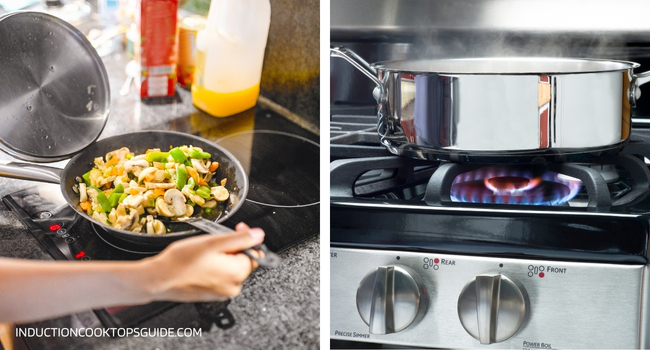
Leave a Reply